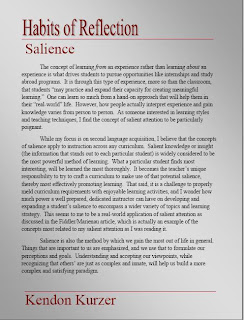
Wednesday, January 27, 2010

http://i.ehow.com/images/GlobalPhoto/Articles/4478201/j0438747-main_Full.jpg
I enjoyed the focus of this article on reflection and inquiry as the means of learning (simplistic summation). The article brought up a point that is important to us on the Humanities Student Council--How can we stimulate our own reflection in order to interpret our experiences and learn more? I thought about several things as I pondered this question. Does relaxation help stimulate reflection? Are there times of the day that I am prone to be more reflexive? What part does the spirit play in meaningful reflection (bringing things to our mind and helping us make connections that we would not have made on our own)? Does this university stimulate reflection? Is reflection required to do well here?

http://fc01.deviantart.com/fs17/i/2007/124/0/7/leave_me_alone____by_madfeather.jpg
In trying to answer these questions (which I will not answer in this blog) I found it helpful to look at my own experience. I have found that I am most reflective during my scripture study, where I find myself evaluating my experiences in light of the scriptures. The next most reflective time is in learning environments where my brain is active. I carry a notebook with me always so that I can write down ideas that come to me throughout the day. Most come during interesting classes, where I begin to reflect on experiences in light of a new piece of information.
Understanding how reflection already happens in my life will increase my learning on the Humanities Council. If I can understand how I reflect, then when I have powerful learning experiences (like I do in HCSC), I can ensure that I find a way to reflect on the experience. I think I will learn more from my HCSC experience this semester with more focused reflection.

http://www.percess.com/data/image/SiteImages/Articles.gif
On SAC we are asked to write follow-ups for each speaker. I think that this is a great way to stimulate reflection. I find myself able to see new things about the presentation that I did not see at first (what was the tone of the presentation, what would have made the presentation more effective etc.).
I have never thought that these weekly responses are a chance to reflect as well, but now that I am reflecting on it, I think that they are. I guess I can start taking better advantage of this opportunity.
Reflection
Reflection on Reflecting
Elizabeth Elzinga Bean
Reflection on Reflecting
After reading the article given to us by Maridee, I would have to admit that the first few pages made me laugh. I laughed because I thought that everyone thought about the experiences they had, and already reflected on how important and meaningful those activities were for them. After all thinking is a natural process, and to write a paper about it, seemed quite absurd. Although, I suppose that for me being a girl, and a worry wart, I find myself searching out meaning in the smallest and insignificant things every day.
Eventually though, as I read more of the article, I started to realize that maybe the way I specifically go about my thinking, is not actually all that good for me. I probably criticize things more than appreciate them; which is why I appreciate what Ephraim said about writing your thoughts down. I think that journal writing and carrying a little book around to write things in, is something that can not only help you in the short term spiritually and with school, but in the long run as your children read through it. I think that writing down these community experiences can help us realize why we enjoy doing the things that we do, and can also help spark interest in our future generations.
I know that for me personally, there is a lot of work that needs to be done in this area. Sure I think about many different things in my life, but if I can really try to put down the most important thoughts on paper, than I can look past the unimportant parts that I normally worry about, and focus on the meaning behind my actions.
I can say that as for our new WAKs, I will enjoy being able to put my ideas from a literary source onto paper.
What Does It All Mean?

As I reflect on the possible interpretations of the image, I am most satisfied with believing the following: Being happy or different has benefits and costs. We are happy when our friends or loved ones are happy, but upset or discontent when strangers or even a smiling yellow ball are cheerful.
Well, perhaps it doesn't matter what it means to me. I could have claimed that I felt the image was attempting to show marketing strategies of MacDonald’s in recent years and I might have just as many people agree or disagree with me. In fact, as humanities majors, I am guessing that, assuming you are still reading this, you have already formed an opinion about these little colored spheres.
Because of our backgrounds and past incidents, we tend to view new experiences with a biased opinion and view. In addition, because each individual is made of different abilities and knowledge, each other individual stands much to gain from interaction. So, when it comes to reflecting upon the meaning of a situation (budgets, projects, events, etc.), perhaps we should be most concerned with how others are thinking and feeling.
Meaning Making

Meaningful Learning and Meaning Making: A Nietzschian Reading
Tristen Maddux
I took a contemporary criticism class last semester, and now I have the unfortunate symptom that whenever I encounter something that claims the ability of creating meaning or having meaning I am slightly skeptical. So when I saw this section on meaningful learning and meaning making, my mind immediately turned to all of those modern and postmodern critics who claim that meaning doesn’t exist. I have specifically decided to view this section through the lens of Friedrich Nietzsche. Nietzsche is, of course, not an exemplary figure of Christian morals or virtue (he famously claims “God is dead” in his book Thus Spoke Zarathustra and writes an infamous essay on the problems of Christianity entitled “The Antichrist”); however, I think his ideas can help to illuminate the idea of meaningful learning.
Because Nietzsche believes that there is no God and that man is just an unimportant speck in an infinite universe, he does not transcribe to any ideas of transcendental meaning. I think the authors of “Developing Habits of Reflection for Meaningful Learning” understand this concept. There is no single way to understand anything, but meaning is created through the individual. Nietzsche calls these individual interpretations “wills to power,” because the way an individual chooses to interpret something represents their views of the world. The authors of “Developing Habits” suggest that “meaning is not characterized just by personal significance. Other key elements include connections made to what one already knew or believed, movement from understanding to action, new beliefs, awareness of emotional nuances, and persistent development of skills,” and I think Nietzsche would agree with this. Our life experiences make up who we are and what we believe. This in turn is going to influence how we interpret future actions.
Nietzsche chooses to express his will to power in a way that I find unappealing. His creation of meaning involves demoralizing Christian values. When we interpret situations and express our wills to power, we are faced with the decision of how we are going to express ourselves. It is important that as we do this, we remember what we truly value and know and use these as guides in creating meaning
Salient Learning with a Twist

Recently, a book was published called Fifty Dangerous Things (You Should Let Your Children Do). Basically, it lists 50 mildly dangerous activities for kids to participate in that may (but likely will not) result in minor injuries. The author presents the book for the purpose of helping parents with providing dangerous opportunities for their children so that they learn from firsthand experiences—although the average child will have already found several of the listed activities.
Take the following activity for example:
By presenting the How-To of super gluing one’s fingers together, parents can now create an event for their kids which will imbue them with valuable experience. As their kids reflect on their experience with super glue, they can learn meaningful lessons from their actions, feelings and emotions. Lessons may include, “I prefer life with a thumb,” or “I don’t believe dangerous things are beneficial to my well-being.”
But what about children who live for excitement? The lessons a rambunctious kid learns from personal reflection on danger may be just the opposite. He may think, “If this is so fun, then I can definitely find something else to glue. Where’s my little brother?”
Imagine if that rambunctious child was shown the following activity:
If he were to learn saliently in the wrong direction, he could very well make conclusions contrary to those that the parent intended, and start sticking forks in power outlets for fun.
That seemed to be the biggest challenge that I considered while reading the article. Teaching others to learn saliently removes a teacher’s ability to set a focal point for learners. I agree with the article when it discusses the tensions between individual and institution. Enforcing at least a marginal degree of focal attention is essential before allowing learners to reflect on where their salient attention lies.
The Prophet Joseph Smith said concerning how he led the saints, “I teach them correct principles, and they govern themselves.” That appears to be the best balance for a teacher to have. Help students understand that, although there are a variety of lessons to learn saliently, there are still right lessons and wrong lessons that will arise.
Tuesday, January 26, 2010
This week's WAC as viewed through an LSAT lens
A. Focal
B. Salient
C. Ambient
D. Trident
E. Zzzzzz...
2. In writing a reflective post about reflective learning, Ryan has felt:
A. Introspective
B. Introverted
C. Entropic
D. Like he's trapped in a hall of mirrors
E. All of the above
3. Ryan believes that, besides when done while speaking in the third person, reflective learning is best utilized when one:
A. Meditates to allow new inspiration to attend
B. Sleeps to allow REM cycles to bring vivid dreams
C. Has a structure within which to work
D. Never
E. I can't think of a 5th option
Okay, enough of that. I'll let you choose your own answers.
As for me, I've reflected on this a great deal, not this particular paper, but on how one learns through reflection. Introspection is actually not recommended by many a psychiatrist mostly because they don't believe people know how to correctly so (and because that would put them out of a job, most likely). In looking back, I believe this to be true, but that one can learn to better reflect on the outcome of events and analyze how they reached certain thoughts, outcomes, etc. This has proved extremely useful for correcting my poor patterns of sticking my foot in my mouth, being overly aggressive, and giving out more information than I should.
Beyond that, in the context of the LSAT, I believe they really look for Focal learning, as they want you to get what they're trying to point you towards. I tend to think of tests as reflective learning experiences, but these aptitude tests t
 hat determine certain positioning don't appeal to me. They're more about gaming the test than what you know. Also, the Logical Reasoning sections require hyper-sensitive reading abilities, and I've thought about the non-conscious (non-salient) processes that we learn while doing anything. Reading closely is an attribute that can be consciously learned, but that is also developed and brings with it non-salient skills. In reading The Brain That Changes Itself by Norman Doidge, I realized that we create certain brain maps simply by doing things, no thinking required. That's kind of scary.
hat determine certain positioning don't appeal to me. They're more about gaming the test than what you know. Also, the Logical Reasoning sections require hyper-sensitive reading abilities, and I've thought about the non-conscious (non-salient) processes that we learn while doing anything. Reading closely is an attribute that can be consciously learned, but that is also developed and brings with it non-salient skills. In reading The Brain That Changes Itself by Norman Doidge, I realized that we create certain brain maps simply by doing things, no thinking required. That's kind of scary.If you are wondering about the random gun, that's the second hit for LSAT on a google image search. Apparently LSAT is also an acronym for Lightweight Small Arms Technology. I love Google. That's also my design element for this WAC and quite appropriate for what I'd like to do to the LSAT.
Monday, January 25, 2010
We are going to study how people learn.
Pargraph one: "Reflection as inquiry"
Reflection makes one expierences more meaningful.
Paragraph two: "Forms of Attention"
Ambient: Kind of paying attention-- not really
Focal: I am really focusing
Salient: I am paying attnetion to what matters to me. I don't really care about you
Paragraph three: "Event to Expierence"
Events are general. I am going to a party.
Experience means that it means something to you-- that ward party changed your life. Amen.
Paragraph four: "Meaningful Learning and Meaning Making"
Question and examine what you are learning-- dont just let it hit you and hope something sticks.
Make learning signifcant.
Paragraph five: "When to Engage in Reflection"
Reflect whenever and however you want. Its important as well.
Reflection is how you make learning meaningful.
Paragraph six: "The Reason for Reflection"
See above.
Paragraph seven: "The Role of Others' Ideas"
Other peoples ideas matter.
Paragraph eight: "Repertoire of Competencies"
Your senses will tell you what your sensitive about.
Paragraph nine: "Tensions Between Individual and Insitution"
Teachers tell students what to think. Teachers can be wrong. The individual can be right.
It depends on the situation.
Conclusion:
We learn more as we grow.
Sara Jarman














